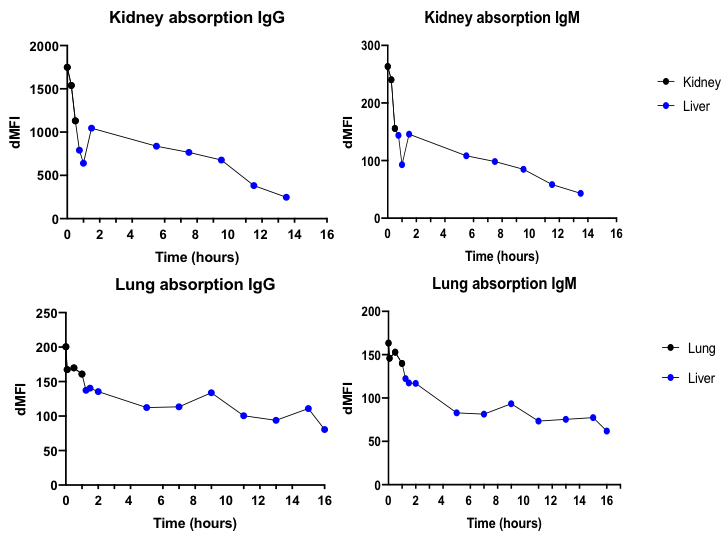Xenoantibody Depletion of Human Blood with Normothermic Machine Perfusion of Porcine Kidney and Lung Prior to Liver Perfusion
1Surgery, Massachusetts General Hospital, Boston, MA, 2Surgery, Tufts Medical Center, Boston, MA, 3eGenesis, Cambridge, MA
Meeting: 2020 American Transplant Congress
Abstract number: A-263
Keywords: Antigen presentation, Liver transplantation, Pig, Xenoreactive antibodies
Session Information
Session Name: Poster Session A: Xenotransplantation
Session Type: Poster Session
Date: Saturday, May 30, 2020
Session Time: 3:15pm-4:00pm
 Presentation Time: 3:30pm-4:00pm
Presentation Time: 3:30pm-4:00pm
Location: Virtual
*Purpose: Genetic modifications of porcine donors for pig-to-human xenotransplantation have led to significant progress in survival of xenografts in preclinical models. Triple knock-out (TKO) of 3 major xenoantigens, αGal, Neu5Gc and Sd(a)-like glycan, reduces human antibody binding to porcine cells by 95% and has markedly attenuated hyperacute rejection. However, a growing body of data implicates activity of the remaining antibody to TKO xenograft failure, including data suggesting improved clinical outcomes in xenorecipients with lower anti-porcine titers of IgG and IgM. Therefore, we sought to test the impact of decreasing residual recipient antibody binding gained through antibody adsorption using ex vivo perfusion of en-bloc kidneys or lung prior to normothermic machine perfusion of porcine livers with human blood.
*Methods: Livers(n=4), kidneys and lungs were procured from TKO Pig 2.0 with additional human transgenes for complement, coagulation and immune regulation. 2 livers underwent immediate perfusion with freshly collected, heparinized human whole blood and plasma on the Liver Assist (Organ Assist, Groningen, NL) while 2 livers had perfusion of en-bloc kidneys or the right lung first. The kidneys were perfused for 30 minutes and the lungs were perfused for one hour. Perfusate samples were collected during perfusion of each organ and subsequently throughout liver perfusion to assess the degree of antibody elimination. A crossmatch assay was completed to assess for IgG and IgM antibody reactivity against Pig 2.0 aortic endothelial cells.
*Results: Liver perfusion following en-bloc kidney perfusion was sustained for 14 hours and after right lung perfusion, the liver lasted 15 hours. Livers undergoing immediate perfusion lasted for an average of 9 hours. After kidney adsorption, IgG antibody level fell by 35.3% and IgM antibody level fell by 40.8%. After lung adsorption, IgG antibody level fell by 19.7% and IgM antibody level fell by 14.4%.
*Conclusions: Antibody depletion by adsorption through another organ is feasible and effective in reducing residual antibody binding and was associated with prolongation of organ survival during machine perfusion. This, combined with genetic modifications of pigs, will improve our ability to overcome the humoral immune response to xenografts and allow investigators to define additional targets of the xeno-immune response.
To cite this abstract in AMA style:
Coe TM, Serifis N, Raigani S, Carroll C, Rickert CG, Matheson R, Detelich D, Qin W, Kan Y, Layer J, Youd M, Westlin W, Yang L, Azimzadeh A, Markmann JF. Xenoantibody Depletion of Human Blood with Normothermic Machine Perfusion of Porcine Kidney and Lung Prior to Liver Perfusion [abstract]. Am J Transplant. 2020; 20 (suppl 3). https://atcmeetingabstracts.com/abstract/xenoantibody-depletion-of-human-blood-with-normothermic-machine-perfusion-of-porcine-kidney-and-lung-prior-to-liver-perfusion/. Accessed February 18, 2026.« Back to 2020 American Transplant Congress

